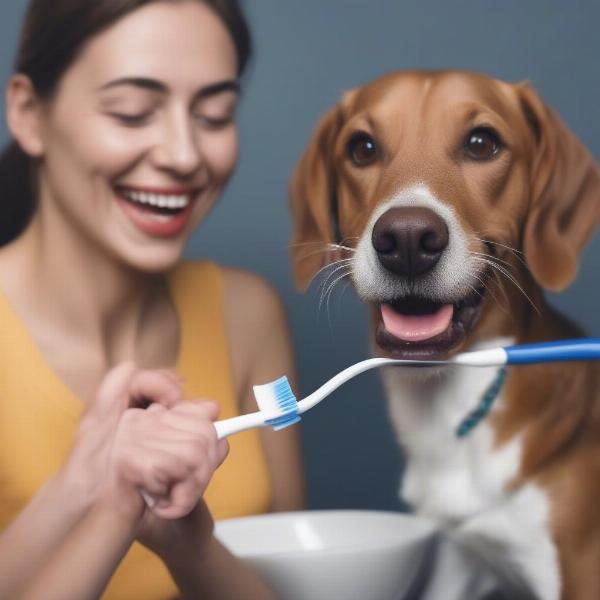Dog plaque is a common dental issue that can lead to more serious health problems if left untreated. It’s a sticky film that constantly forms on your dog’s teeth, harboring bacteria that can cause bad breath, gum disease, and even tooth loss. Understanding what dog plaque is, how to prevent it, and how to treat it is essential for every dog owner.
Dental care is a crucial aspect of your dog’s overall health and well-being. While many owners focus on diet and exercise, dental hygiene often gets overlooked. This oversight can result in significant discomfort for your dog and expensive veterinary bills down the line. By proactively addressing plaque buildup, you can contribute significantly to your dog’s long-term health and happiness. So, let’s delve into the world of dog plaque and equip you with the knowledge you need to keep your canine companion’s teeth sparkling clean.
What is Dog Plaque and Why is it a Problem?
Dog plaque is a biofilm composed of bacteria, saliva, and food particles. This sticky film adheres to the tooth surface, creating a breeding ground for harmful bacteria. These bacteria produce acids that attack tooth enamel, leading to cavities and gum inflammation (gingivitis). If left unchecked, gingivitis can progress to periodontitis, a severe infection that damages the tissues supporting the teeth. Periodontitis can cause pain, tooth loss, and even spread infection to other parts of the body, affecting vital organs like the heart, liver, and kidneys.
Preventing Dog Plaque: A Proactive Approach
Preventing plaque is much easier and less expensive than treating its consequences. Here are some effective strategies:
- Regular Brushing: Brushing your dog’s teeth daily with a veterinarian-approved toothpaste is the gold standard for plaque prevention.
- Dental Chews and Treats: These can help scrape away plaque and stimulate saliva production, which helps wash away food particles. Choose products with the Veterinary Oral Health Council (VOHC) seal of approval.
- Dental Diets: Specifically formulated kibble can help reduce plaque and tartar buildup through its texture and ingredients.
- Regular Veterinary Checkups: Your veterinarian can identify early signs of dental disease and recommend appropriate treatment.
 Brushing a dog's teeth
Brushing a dog's teeth
Treating Dog Plaque: Professional and Home Care Options
If your dog already has plaque buildup, professional cleaning by a veterinarian is necessary. This procedure involves scaling and polishing the teeth under general anesthesia to remove plaque and tartar. After professional cleaning, maintaining good oral hygiene at home is crucial to prevent recurrence.
Home Remedies for Dog Plaque
While professional cleaning is essential for established plaque, some home remedies can support your efforts:
- Coconut Oil: Adding a small amount of coconut oil to your dog’s food may have some antibacterial properties.
- Dental Wipes: These can help remove plaque and freshen breath, especially for dogs who resist brushing.
- Dental Sprays: These can help control bacteria and freshen breath, but they don’t replace brushing.
How often should I brush my dog’s teeth?
Ideally, you should brush your dog’s teeth daily. However, even a few times a week can make a significant difference in preventing plaque buildup.
Can I use human toothpaste on my dog?
No, human toothpaste contains ingredients like xylitol, which are toxic to dogs. Always use a toothpaste specifically formulated for dogs.
Expert Insights on Dog Plaque
Dr. Emily Carter, DVM, a renowned veterinary dentist, emphasizes the importance of early intervention: “Addressing plaque buildup in its early stages is crucial for preventing more serious dental issues down the line. Regular brushing and veterinary checkups are essential for maintaining your dog’s oral health.”
Dr. Robert Miller, DVM, another prominent veterinary dentist, adds: “Dental disease can significantly impact a dog’s quality of life. By prioritizing dental care, we can help our canine companions live healthier, happier lives.”
Conclusion
Dog plaque is a preventable problem that can have serious consequences if left untreated. By implementing a proactive dental care routine, including regular brushing, appropriate dental products, and veterinary checkups, you can help your dog maintain healthy teeth and gums throughout their life. Don’t underestimate the importance of dental hygiene – it’s an investment in your dog’s overall health and well-being.
FAQ
- What is the difference between plaque and tartar? Plaque is a soft, sticky film, while tartar is hardened plaque that is more difficult to remove.
- What are the signs of dental disease in dogs? Bad breath, red or swollen gums, difficulty eating, excessive drooling, and pawing at the mouth.
- How much does a professional dental cleaning cost? The cost varies depending on the location and severity of the dental disease, but it typically ranges from $300 to $700.
- Are there any natural remedies for dog plaque? While some natural remedies may offer supplemental support, they are not a replacement for professional cleaning and regular brushing.
- Can dog plaque cause other health problems? Yes, untreated dental disease can lead to infections in other parts of the body, affecting vital organs.
- How can I get my dog used to teeth brushing? Start slowly and gradually, using positive reinforcement and a dog-friendly toothpaste.
- What should I look for in a dental chew for my dog? Look for products with the VOHC seal of approval, and choose a size and texture appropriate for your dog.
ILM Dog is your trusted resource for all things dog-related. We offer expert advice and information on dog breeds, health, training, nutrition, grooming, and much more. From puppy care to senior dog care, we’re here to help you navigate every stage of your dog’s life. Visit our website for more valuable resources. Contact us at [email protected] or +44 20-3965-8624. ILM Dog is dedicated to providing comprehensive and reliable information to help you provide the best possible care for your furry friend.